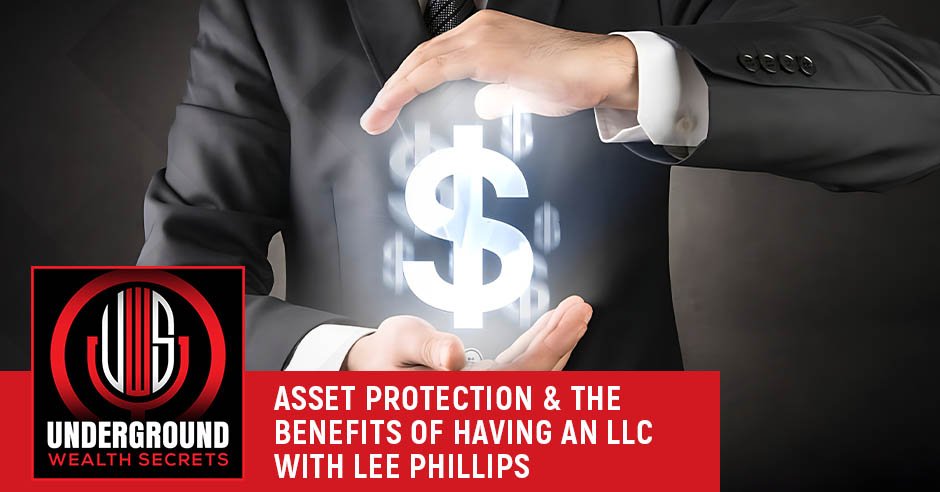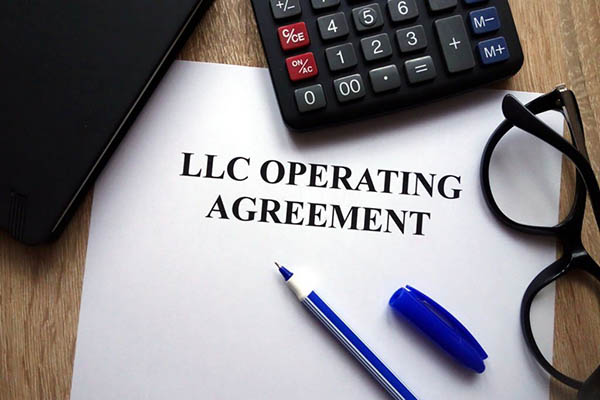Asset Protection & The Benefits Of Having An LLC With Lee Phillips
- Post author By rldiamond
- Post date October 28, 2022
- No Comments on Asset Protection & The Benefits Of Having An LLC With Lee Phillips

LLC is the most flexible legal tool any entrepreneur can ever have. It gives you double asset protection and allows you to pick your own tax structure. But alongside its many benefits are also some pitfalls you need to avoid. Lee Phillips joins Julie Houston to discuss the right way to maintain an LLC, as well as its legal differences compared to corporations and partnerships. He explains the importance of having an operating agreement, picking the best tax structure, and keeping your business safe from the cunning claws of the IRS.
—
Watch the episode here
Listen to the podcast here
Asset Protection & The Benefits Of Having An LLC With Lee Phillips
I’m excited. I’m here with Lee Phillips. Lee, welcome to the show. It’s such an honor to have you here.
It’s my honor to be here.
It’s always great when I get to talk to Lee. I got to start. Will you tell us a little bit about yourself and your background because it’s pretty impressive?
I’m a liar. You are down in Texas. That’s Texas for attorneys. I’m a US Supreme Court Counsel, and I have been doing the asset protection and the tax stuff for a long time. I’m one of the old guys.
With an impressive background, though. I don’t know that I’ve met anyone that’s on the Supreme Court of anything.
I’ve known Bob and Ed Diamond for many years too. They are great to work with.
They are incredible. They are honored to have you here as well.
I appreciate them.
You are an expert at a lot of different things associated with law, entities, and LLCs. I got to ask you, for our readers, what are the benefits of having an LLC?
An LLC is probably the most flexible legal tool that we have. In fact, it gives you double asset protection. It allows you to pick your tax structure. When I say asset protection, you say lawsuit. No. Your major asset protection threat is, in fact, the IRS. The LLC gives us the flexibility to choose whatever tax structure we want, and it depends upon how you are making your money and how you want it taxed.
I can’t give you an exact answer because it’s unique to each individual. I will tell you that the LLC allows you to do it better than any other legal entity, a legal tool, as I call it. The tools are all different. You have been down to the lawyer, and the 1st lawyer gives you this answer, the 2nd lawyer gives you this answer, the 3rd lawyer gives you this answer, and your accountant gives you the 4th answer. What they are doing is they are using the tools that a lawyer has, and we only have a few but we can make different structures.
A contractor only has hammers and saws but they can make different structures with those same tools. One law firm is using the tool for tax stuff. Another law firm is using the exact same tool but they are using it for asset protection. You get different answers depending on which firm you go to. A hammer, does it drive nails in or pull nails out, Julie?
It’s both.
It depends on what hammer. If you got a ball-peen hammer with one of the little rounds knob-y things on the end, then it doesn’t pull nails out but the tools are used differently. The LLC is the most flexible tool we have. It can give you more money and double the asset protection you get from any other tool.
I didn’t know that.
Most people don’t. In fact, most lawyers don’t understand the asset protection capability of an LLC. There are two aspects of asset protection. The corporate shield protects me from what happens in the company. That’s the corporate shield. That’s what a corporation has. An LLC has that exact same corporate shield, except it has another facet of asset protection, which protects the assets of the company from what happens to the owner of the company.
That’s a big deal because I’ve seen a lot more people lose their company than I have people lose their house because of something that happens in the company. Fifty six percent of all bankruptcies in the United States are a result of somebody in the family getting sick. It isn’t a lawsuit. It’s an illness. You’ve got to protect against that thing. You hit a kid in the crosswalk on the way to church. That’s not a business problem. Yet are you going to lose your rental properties or your little business and all of its assets because of the accident out on the street?
How about if you get divorced? That’s not a business problem, yet that’s a financial disaster for many small business owners. We’ve got to protect against all of these things. The big asset protection threat is the IRS. Those guys are taking half of everything you are making, and don’t tell me they are not getting half of it. They don’t even call them taxes anymore. They are fees.
You love the IRS. They are getting 78,000 brand-new shiny IRS agents to come after you. If you don’t think they are coming after, you got another thing coming because there aren’t that many millionaires or billionaires that we are going to go after. You can’t have 40 people gang up on 1 millionaire. They are intended for you. In fact, the IRS is doubling its size and budget under this new law. They are going to be twice the threat that they are now. The IRS takes a chunk of your money and is guaranteed to take it every year. If I can cut your tax budget by 20%, how much you pay the IRS? That’s huge.
IRS is doubling its size and budget, making them twice the threat they are today. They take a chunk of your money and are guaranteed to take it every year. Click To TweetPeople don’t understand how much money it is. Let’s take $1 and double it twenty times. $1, $2, $4, $8, $16 or $32. You got it. There’s no tax on that sequence, is there? Let’s tax it at 40%. Federal and state, a lot of people are in that category. I take $1 and double it but that gives me $1 in profit, doesn’t it? I’ve got to tax the extra dollar, so I don’t end up with $2. I end up with $1.60. I took $0.40 off the extra dollar.
Let’s double $1.60. That’s $3.20 but I don’t get $3.20 because I’ve got to tax the extra $1.60, the profit. I end up with $3.51. At any rate, you are taxing it at 40%. Over here, if I double it twenty times with no tax, I have $1,048,000 in change. If I tax it at 40%, that means I’ve got my $1,048,000 over here. If I lose 40% of that, that’s $400,000. That’s huge.
That’s a lot of money. I have $1,048,000 over here, and do I have $600,000 over here? I don’t think so. How much do I have over here? $1,048,000. I only have $12,089 over here. I’ve gone from $1,049,000 to $12,089. The eighth corner of the world is compound interest. Haven’t you heard that?
I’ve heard that.
What people don’t understand is taxes or compound interest in reverse. If I can save you 20% on your Tax Bill out of $1,000, that’s $200 but over your lifetime, that’s thousands and thousands of dollars. The taxation is huge. That’s your number one asset protection threat. Your second one is a family illness. The third one is probably your accident out on the street.
Your corporations don’t protect you against any of those asset protection threats. The protection of a lawsuit is down the line of ways. That’s what the corporation protects you against. The LLC protects the company assets, your rental unit from your illness, your divorce or your taxes because you guys still got to pay taxes. We can control the taxes much better with an LLC than any other legal tool a little lawyer has.
It’s huge savings and huge disaster prevention because we are preventing the disaster from affecting your business, and that’s big. We want to protect you from any disaster that occurs in the business. That’s the corporate shield but protecting the business from what happens to you that’s called charging order protection, and it’s a big deal. The lawyers never discuss it. The internet never discusses it. Nobody discusses it. I’m going to tell you that 99.9% of the time, you will use an LLC, not a corporation. Don’t use a corporation.
What are some of the best tax shelters that you would recommend for real estate and even small business owners?
You hit it. You have to understand a concept called Adjusted Gross Income, AGI. You’ve heard the term. It’s the bottom line that calculates. It sets your tax rate, and then the accountants said, “Phillips, your nuts.” It determines whether or not you get your childcare deductions, whether or not you phase out, and whether or not you are paying alternative minimum tax. It determines all these factors. It’s your AGI.
Above the line is the AGI line. Anything you do on your tax return above the line either adds to or subtracts from your AGI. Anything you do below the line has nothing to do with your AGI. All of your mortgage deductions, your medical expenses, your charitable contributions, and all these things that your financial planner talks to you about are all below the line. You’ve got to learn to work above the line and hit it.
The only two ways that you can work above the line are your business and your real estate. Your real estate is the most fantastic tax shelter that exists in the IRS. People get rich on real estate. You know the concept of real estate appreciates and some of the concepts that the tenant is paying you the rent, you take the rent, and you pay the mortgage off. The tenant is paying the mortgage, the tenants buy in the real estate for you, and in the meantime, it’s appreciating. You are getting rich. What you don’t understand is that the tax aspect of real estate more than doubles what I described to you.
I can promise you I’m not utilizing mine enough.
You need to learn how to use real estate as a tax shelter. We will have to do another episode on that.
We are going to have to. That’s where I’m at that level of seeking. Where are the benefits of it now?
Your little business and your real estate are your two tax shelters. If you use the LLC, you can maximize taxes on the business. Real estate is another story. I will tell you that most accountants are not picking up on real estate taxation possibilities. Accountants are conservative people. They don’t buy real estate. They don’t understand real estate. I’ve done asset protection for many years. I buried in the tax stuff. I’m a US Federal Tax Court Attorney in my office.
Accountants are conservative people. They don't buy and understand real estate. Click To TweetThat means I fight the IRS on their home court. In my office, I have a former IRS special agent and special auditor. I have the former head of the Western division of the IRS. These people all work in my office. When I say taxes are a big deal, I understand they are a big deal, and I’m willing to put my money where my mouth is. Your LLC is your doorway to controlling taxes in your small business.
Why is it better than having a corporation, out of curiosity?
On a corporation, I can only have the IRS code Chapter C taxation, and you call out a C corporation. I can have a Subchapter S corporation. The corporation is identical. The legal structure is the same piece of paper but you choose to have it taxed under Chapter C of the IRS code or Subchapter S of the IRS code. I have 1 of those 2 taxation structures with a corporation.
With an LLC, I get twice the asset protection but I can choose to be taxed under Chapter C of the IRS code. I can choose to be taxed under Subchapter S of the IRS code. I can choose to be taxed as a partnership, which, if you are doing long-term rental real estate, you want to have a partnership, not a corporation. If I’m doing flips, I’m probably going to have a Subchapter S entity.
I’m going to have the LLC and have it taxed as if it were a Subchapter S corporation. I’m going to have it taxed under Subchapter S of the IRS code. On an LLC, I can even make it a disregarded entity. I get all the asset protection but the IRS doesn’t even know it’s there and they don’t care. All they know is that I file a Schedule C or Schedule E on my tax return, and it’s my Social Security number. It’s like nothing happened. I’ve got all the asset protection, and it’s just me being the tax dude. It makes it easier to file taxes because I’m filing as an individual as me. I’m not filing a separate return for a partnership, a Subchapter S entity, or a Chapter C entity.
How do what tax structure would be the best for you?
I can’t tell you because it depends on how you are making your money. If your dude has said that you need a Chapter C entity, a C corporation, no. The answer is 99.9% of the time. As a small business person, it’s no. As a real estate investor, it’s a big no. Any other questions? You do not have a C, and if you are currently filing a C corporation structure or an LLC taxed under Chapter C, you need to get rid of your accountant and do something else. I can tell you that.

We’ll talk more for sure about that. What do you have to do to maintain the LLC?
A lot of the state statutes say, “You don’t have to do a thing.” You don’t have to keep minutes. You don’t have to have meetings. You don’t have to do any of this crap. In fact, the state that I live in has a law that says that an LLC does not have to follow any of the formalities of a corporate shield or a corporation. Let me go back and think about it for a minute. I said that the corporate shield was identical to the LLC. If it’s identical, don’t you think that maybe you have to do the same things that you need to do for a corporation to get asset protection? The State Law says you don’t have to do that.
Here’s the deal. If I’ve got the same corporate shield, I’m going to have to follow the same structure and formalities as a corporation. When I get into court, I get sued. The whole argument is going to be, “Your Honor, this guy didn’t have a real company. He had what we call his alter ego. It’s him in a recreated format.” The way you show the judge that, “This isn’t me. This is a real company.” The way you show the judge that it’s a real company is you say, “I followed these formalities. I held business meetings. I took minutes in my meetings. I had separate checking accounts for my company. I followed separate taxes for my company.”
That’s not a big one because I could have a disregarded entity, an LLC. I would still get the asset protection. I’ve kept everything separate. I treated this company as an arms-length deal. “Your Honor, in everything I did, I treated this as a real company. I used to work for one of the big oil companies, and if I bought something on my expense account, I wanted to be reimbursed. They didn’t reimburse me for anything that I couldn’t prove that was on that expense account and was their deal.”
“Are you buying crap on your company, writing it off, and doing all this stuff? Are you treating this as a real company?” If I can say, “Your honor, I treated it as a real company,” the judge is going to say, “You are right. You did treat it. You showed me the minutes of your meetings. You showed me all these formalities. You treat it as a real company. I’m going to treat it as a real company. You can’t sue him personally.”
If I didn’t treat it as a real company, I commingled my money, and it was just my piggy bank and pet project, then the judge is going to say, “This is you in a reincarnated state, your alter ego. These guys can sue you directly.” They do what’s called piercing the corporate veil. That’s the way we fall into the trap. If the argument is the same with an LLC as it is a corporation, it probably ought to be doing the same things to show the judge that, “I’m doing this thing. It it’s a real deal.”
That makes sense. What if I wanted to set up my own LLC? Would you recommend that?
To be honest with you, I would tell you to do your own LLC. I’ve got a kit that does it all, teaches, and walks you through it but I would do your own LLC. It’s easy to set up an LLC. You go to your state’s website, and your state on the website has the form. You fill out the form. It’s your name, your rank, your serial number, and your address. They ask for the name of the company. They ask what the purpose of the company is. “I’m going to make widgets. I’m going to invest in real estate,” or whatever it is. You pay your credit card fee online. You now have an LLC. A lot of internet websites say, “That’s all I do for you.”
You can do it, no problem but there are other things you’ve got to do. You’ve got to have an operating agreement. If I don’t have an operating agreement, I don’t get any asset protection because I can’t even get off square one to tell the judge that, “I treated this like a real company.” “Where’s your rule book?” The rule book is the operating agreement. “You don’t have a rule book? No problem. No asset protection. You didn’t treat it like a real company.”

The operating agreement is critical. It’s your rule book. When I sue you, I’m always going to ask for your operating agreement, and you have to give it to me. I’m going to go down and get you in court and say, “Did you do this and that?” You are going to say, “I filed more articles in my corporation or my LLC. I did this. I don’t know if I did that. No, I don’t think I did that.”
After a minute, the judge says, “You obviously didn’t do what your rule book said you were supposed to do. You didn’t treat this as a real company and pierced the corporate veil.” I’m going to tell you something. The corporate veil protects me from what happens in the company. The charging order protection, this other asset protection, is not reliant on the formalities. You get the protection that protects the company assets from what happens to you in any case, provided you do it right. There are about twenty states that have put restrictions on what you have to do to get this charging order protection. It’s iffy.
I would rather follow a professional’s advice than figure it out on my own and miss one box or something like that.
Here’s the problem, though. The lawyer is going to set it up for you, and he may push you out the front door in the right direction but you’ve got to operate this thing. It isn’t something you have to stick in the file cabinet and forget about it. You’ve got to operate it. It’s got to be an integral part of what you are doing. You got to think, “I’m not me, I’m a company, and I’ve got to think like a company.” You can’t rely on the advice of the professional because you’ve got to operate on this baby as you go along. It’s not hard but nobody ever sits you down and explains it to you.
The lawyer charges you $2,000 or whatever it is for the LLC. He kisses you on both cheeks, shoves you out the front door, and gets out of there. “I got out of there only paying this guy $2,000. I sure hope I didn’t catch anything.” You didn’t hang around and have him explain to you what has to be done because he’s going to charge another $1,000. As a result, you were out of there. That’s the way they all end up.
Ninety-five percent of these small companies, if you do get sued, they don’t give you the promised asset protection. The whole thing is a scam by the government. Small business is the backbone of our economic country. That’s what they always say. It is. To induce you or seduce you or whatever it is to set up a little company, they hold a carrot out in front of you.
They say, “Little business guy, you chase this carrot and set up your company, your LLC or your corporation, and we will protect you from the risks that are associated with that company. If your driver that’s in the van delivering the pizza or whatever it is, does hit a kid in a crosswalk and paralyzes the kid, does the government want to hold you harmless for that problem? No.
They want you to pay for that problem because if you don’t, then society is going to have to. We’ve lost all the taxes that that guy would’ve earned during his lifetime. They are all of his medical expenses, There’s all of this education stuff. We got to take special care of him. If you don’t pay for it, then the government, the taxpayer pays for it. The government doesn’t want that.
When they hold this carrot out in front of you and say, “Follow the carrot around, and we will give you asset protection,” they will give you asset protection provided you jump all of these hurdles, and the formalities are some of the hurdles. You’ve got to jump all the hurdles, and nobody ever sits a small business person down and explains to them what the hurdles are, how you get across them, and how you jump them. They are easy to jump. You can do it. In fact, I’ve developed a system. I figure it takes you about two hours a year to do the whole thing. That’s not bad.
You can do that but you’ve already got your corporation or your LLC. You haven’t been doing any of this crap, and you are going, “I can’t do this.” You are right. You can’t do it. We are not going to go back and try it and do it. We are going to start now and move forward. A few years from now, you will get sued. The judge looks at it and says, “You have been doing pretty good the last three years. What happened in the last five years?” You say, “Nobody ever told me I was supposed to do this. I wanted it to be a real company. I read about this idiot lawyer on a show, and he learned what I was supposed to do, and I have been doing things since then. The judge will say, “You are probably right. You probably did want to do this.” Start now and go forward.
What would be your 3 to possibly even 5 takeaways you would want our audience to hear or know from this interview?
The first one is that an LLC has double the asset protection of a corporation. The second one, the LLC, allows you to be taxed however you want to be taxed. The third one, the LLC, is as easy or easier to maintain than a corporation. A partnership doesn’t require any maintenance but it doesn’t give you asset protection either. You don’t want that one. I said you wanted a partnership if you were doing long-term real estate rental, didn’t I? That’s partnership taxation. That’s not a partnership legal structure. That’s where people get confused.
The legal structure of an LLC is the same. It gives you the same asset protection whether you are taxed as a partnership, a sole proprietorship, Subchapter S or Chapter C. People are confused, “I’m supposed to have a partnership to do long-term real estate.” You are supposed to have a taxation structure of a partnership. You are going to have a legal structure of an LLC. We’ve got the fact that you get double asset protection. We have the maximum tax-structured choices, and it’s a little easier to maintain the corporation.

My guess would be that an LLC needs care and feeding a corporation does to get the promised asset protection. To review everything you went over, that would be one. Choosing the right tax structure can cut your chances of an IRS audit by over 90%.
I’ve said that before. I didn’t say that now.
That’s one of the tips you shared with me prior.
You’ve heard me say that before. Do you want to know what the secret is?
What?
We’ve got our 87 billion new IRS agents. The goal is to ten times the number of audits. Here’s the secret. The secret is that any IRS agent can audit 1040 with a Schedule C or a Schedule E. All six billion IRS agents can audit your 1040. Less than 5% of IRS agents can audit a partnership return, a Sub S return, or a C return. If you’ve cut the number of agents by 95%, didn’t you lower your chances of an audit?
Yes. Big time.
In fact, I go through a number of other ways and in training where you can lower your audit a lot, more than 90%.
Thank you so much, Lee.
It’s great to be with you. We always have fun.
We always have a blast. For our readers, we are going to have more information that we discussed. Lee offered a mini-course for us. That’s going to be at UndergroundWealthSecrets.net/leeminicourse.
It’s five emails. You get 1 a day for 5 days, and it’s about 2 pages of discussing charging orders and taxes.
It’s going to be great. Check it out. Thank you again, Lee, so much for this interview. It has always been a pleasure and an honor when I have you on.
It’s great to be with you, Julie. You are one of my great friends, and so are the Diamond’s. This was an extra honor for me.
Thank you.
You are welcome.
Important Links
- UndergroundWealthSecrets.net/leeminicourse
- UndergroundWealthSecrets.net/freecourse
- UndergroundWealthSecrets.net/facebookpage
- UndergroundWealthSecrets.net/TikTok
- UndergroundWealthSecrets.net/youtube
About Lee Phillips
 Attorney, Lee R. Phillips, will teach you how to reposition yourself in the law so that you can go out and make more money than you have ever thought possible. You will be amazed at how a good knowledge of the law will actually let you make more money. In today’s lawsuit happy society, making it isn’t enough. You also have to know how to protect your wealth, or someone will take it away from you. Protecting your wealth is easy when Lee shows you what to do. It might be your tenants, the IRS, the government regulations (like lead paint) or some greedy lawyer. Unless you are shielded, everything you have can be lost. Lee is a counselor to the Supreme Court of the United States and an engaging speaker with over 10,000 hours on public stages. He is also a Federal Tax Court attorney and fights the IRS in their own court. He will walk you through how to make it and how to keep it using the tools of wealth. Nobody ever gets rich without an understanding of the tools that create wealth and protect it.
Attorney, Lee R. Phillips, will teach you how to reposition yourself in the law so that you can go out and make more money than you have ever thought possible. You will be amazed at how a good knowledge of the law will actually let you make more money. In today’s lawsuit happy society, making it isn’t enough. You also have to know how to protect your wealth, or someone will take it away from you. Protecting your wealth is easy when Lee shows you what to do. It might be your tenants, the IRS, the government regulations (like lead paint) or some greedy lawyer. Unless you are shielded, everything you have can be lost. Lee is a counselor to the Supreme Court of the United States and an engaging speaker with over 10,000 hours on public stages. He is also a Federal Tax Court attorney and fights the IRS in their own court. He will walk you through how to make it and how to keep it using the tools of wealth. Nobody ever gets rich without an understanding of the tools that create wealth and protect it.







